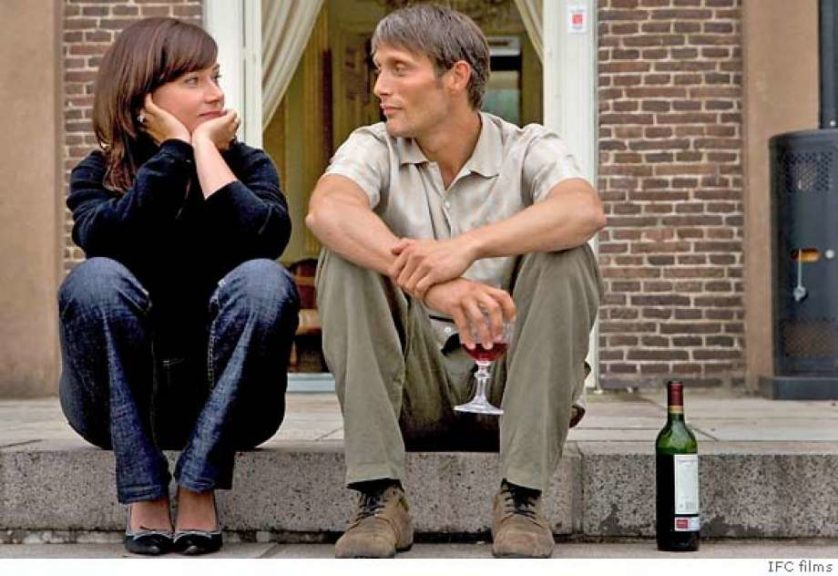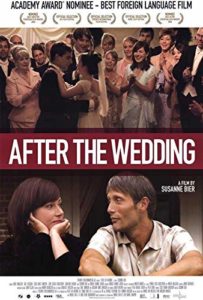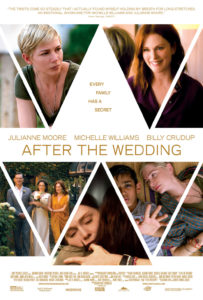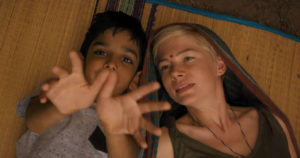(2006) Directed by Susanne Bier | Written by Bier and Anders Thomas Jensen | 120 min
Mads Mikkelsen puts his icy, Scandinavian reserve to work as Jacob, a Dane who has spent 20 years or more in India working with orphaned children. He returns to Copenhagen to meet with a philanthropic investor, a gruff, older businessman Jörgen (Rolf Lassgård) who admires Jacob’s verve and invites him to the wedding of his daughter. Turns out, Jörgen’s lovely wife is Jacob’s former girlfriend Helene (Sidse Babett Knudsen of Borgen and Westworld), with a few secrets of her own, turning Jacob’s world upside down.
This sets up a stylish and satisfying melodrama of awkward familial dynamics and reunions, shot amongst the Danish upper crust, using the picturesque capital city as its backdrop. Bier prefers intimate hand-held camerawork to keep us engaged, and the script doesn’t shy away from intense emotional character situations. With a flurry of close-ups, especially of the eyes, and an eventful narrative arc, the film (which was nominated for Best Foreign Language Film at the Oscars, but The Lives Of Others took it that year) feels evergreen, a minor classic.
I wish I could suggest you track it down on streaming services, but I was unable to find it there. This is why physical media is still the best way to go. If you live in Halifax, the library has a copy on DVD.
(2019) Directed by Bart Freundlich | Written by Freundlich, based on the screenplay by Bier and Thomas Jensen | 111 min | Netflix
The inevitable American remake of the Danish original from indie filmmaker Freundlich, who also happens to also be partner to Oscar-winning Julianne Moore, who anchors this version with her typically frank performance. Having seen her recently in another English-language remake, Gloria Bell, I did enjoy that we first spy her in this singing in her car, which we get a lot of in the Lelio film.
The big change with this version of After The Wedding is a gender switch. Instead of male Jacob, we have female Isabel (Michelle Williams), who goes from Tamil Nadu to New York to meet with wealthy investor Theresa (Moore). It turns out Theresa’s husband, Oscar (Billy Crudup), has a history with Isabel. With this change, the big secret here needs a far more convoluted backstory to unfold, and that convolution is, even in the context of a melodrama, implausible. It also provokes a thread about child abandonment that feels like a sop to conservative American audiences.
Put simply, it’s hard to compare most remakes favourably to the original—even though I did with Gloria Bell, and that was largely due to Moore. But even her immense talent isn’t enough to make this film more than a curiosity for people interested in how Hollywood adapts across culture. Freundlich sanitizes the Indian poverty, and then offers a wish-fulfillment vision of American wealth, where Bier and Thomas Jensen provided a more critical take on out-of-touch privilege with a story set in socialist Danish society. The end result is the new version can’t help but feel polite, tasteful, and unrelentingly middlebrow.
One way it manages to be at least diverting, despite this, is the chemistry between the two lead women. In the Bier picture, the key relationship was between Mikkelsen and Knudsen, the former lovers coming to terms with their past, while Lassgård played puppet master. Here, Crudup’s Oscar is fine, but bland. He and Williams have no chemistry, so it’s up to Williams and Moore to bring the heat, and they have a few good scenes together.
Williams’ Isabel isn’t angry, she’s reserved—a meditator whose cool eyes flash when she’s forced out of her comfort zone. Moore’s character is set up as a corporate creature in the first half, though she brings more emotion in the homestretch with scenes lifted almost word-for-word from the Danish version.
The final piece here is Abby Quinn (Landline), as Grace, Oscar and Theresa’s daughter. She holds her own amongst the veterans, which ain’t nothin’, but physically doesn’t resemble key relatives. That’s a casting decision, and it’s a distraction, another way the original has the edge.












